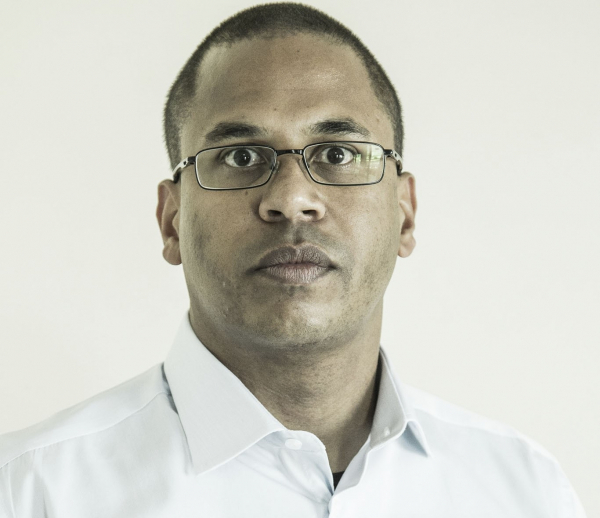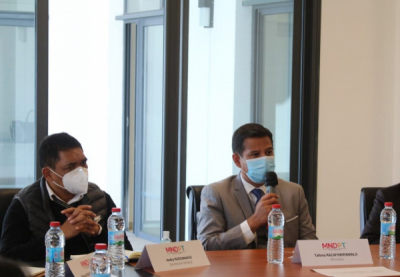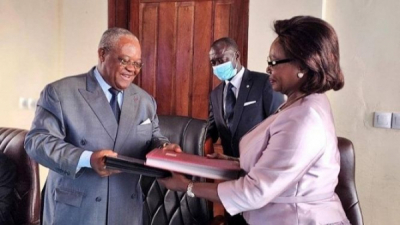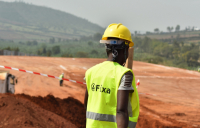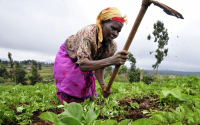After a short professional career as a marketing and web strategy consultant for SQLI Group in France, he returned to his native country, Senegal. At 24, he was one of the digital marketing pioneers in his country with the creation of People Input.
Serigne Barro (photo) is the CEO and founder of consulting firm People Input. The Dakar-based firm was established in 2002. It guides firms in their strategic marketing decisions and develops innovative solutions that give those firms competitive advantages.
According to its CEO, People Input creates websites for its clients and helps them get visibility, on social media particularly. When it started operations, the startup had to face notable challenges. “When we first entered the [Senegalese] market, firms were not aware of the importance of the services we were offering and did not care much. We had to inform and convince them,” the CEO explains. He succeeded in doing just that. Nowadays, besides Senegal, the startup is also present in Cameroon, Mali, Côte d’Ivoire, and Burkina Faso.
Thanks to People Input, he received several awards, including the 2012 WAEMU Award for best ICT Initiative. He also received the national award for the best ICT company in Senegal in 2012. Then, in 2016, he received the award for the best digital agency in Senegal and the best business solution in West Africa.
In 2014, he co-founded the communication agency Voice Africa, a joint-venture formed with advertising firm Dentsu SSA. Since 2018, he is the CEO of Dentsu SSA’s Francophone Hub. In 2020, in recognition of his achievement in the digital sector, he was appointed a member of Senegal’s National Digital Council.
Melchior Koba
In some parts of the African continent, it is still hard to access healthcare either because of the lack of healthcare personnel or their distance to health centers. Some tech entrepreneurs are trying to fix that.
Clafiya is an e-health platform that allows access to affordable healthcare in Nigeria. It connects patients in rural and peri-urban areas to community health workers.
The platform was developed by eponymous healthtech startup Clafiya founded in 2020 by Itoro Inoyo and Jennie Nwokoye. Its goal is to allow everyone to access healthcare. As its co-founder Itoro Inoyo explains, health is a fundamental human right so, no one should be left out no matter their race, gender, or socioeconomic status.
As internet connection is not always available in the areas targetted by Clafiya founders, the platform is accessible via a USSD code (*347*58 #). Users can then dial the code, register by providing a set of information, and book primary care anytime they want.
The healthcare packages offered by Clafiya cost between US$4.9 and 12. Each of the packages allows access to different primary care and services including blood pressure and blood sugar level screening, primary care consultation, rapid malaria, and typhoid diagnostics. If the case is serious, the patient is referred to a medical specialist, either online or offline.
Adoni Conrad Quenum
Before the creation of this center, the government’s digital transformation plans used to be implemented by many actors, sometimes rendering the actions inefficient. With the center, Madagascar intends to streamline actions for more efficiency in its digital transformation plan.
Madagascar recently created a special unit for the implementation of national digital transformation policies. The unit was baptized Digital Governance Center (UGD- Unité de Gestion Digitale). On June 8, 2022, the decree creating it was approved during the Ministerial council held the same day. That decree categorized the UGD as a public industrial and commercial entity with the Presidency and the Ministry of Digital Transformation as overseeing authorities.
According to Andry Rasoanaivo (photo, left), secretary-general of the Ministry of Digital Transformation, UGD will be the government’s operational arm in the digital sector. It will implement the various digital projects (public sector digitization notably) being developed. It will particularly implement the Digital Governance and Identification Management System Project (PRODIGY) whose main goal is to have a unique digital identity for every Malagasy and create a digital civil registry accessible to every public administration by end 2022.
Overall, the digital governance center will streamline the government’s strategic and financial actions for digital transformation. It will also help efficiently manage human resources.
In 2021, Madagascar became more focused on the digitization of public administrations and companies in a bid to improve their contribution to post-pandemic recovery. The digital transformation projects are notably aimed at modernizing public administration, preventing corruption as well as boosting economic development and social/financial inclusion. The various efforts are backed by international partners.
Ruben Tchounyabe
Some ten years ago, Cameroon quicked-off plan to shift to e-governance. Some administrations are not making enough efforts to digitize their services but others are stepping up investments to keep up with trends in an increasingly connected world.
Cameroon’s Ministry of Public Service signed, Monday (June 13), a Memorandum of Understanding (MoU) with incumbent telecom operator Camtel. The aim of the MoU is to ensure the optimal availability of the online services offered to users and data security.
According to Minister of Public Service, Joseph Le (photo, left), under the MoU, Camtel will facilitate the Ministry’s staff access to the files and applications submitted by users thanks to its secure and redundant internet connection as well as broadband interconnection (via specialized optical fiber or radio waves). The incumbent operator will also permit the public to easily submit applications for civil service competitions online and allow the quick issuance of civil service certifications and the optimal management of the integrated payroll management system SIGIPES in regional offices.
During the signing ceremony, Camtel’s MD, Judith Yah Sunday (photo, right), explained that the incumbent operator would provide the various services expected by the Ministry of Public Service by leveraging its data centers. Indeed, the MoU was being worked out since May 4, 2021, when Minister Joseph Le carried out a guided tour at Camtel’s Zamengoé data center. The visit was called by Judith Yah Sunday in preparation for the operationalization of the integrated payroll management system SIGIPES.
In the past five years, the Ministry of Public Service carried out a number of digital transformation reforms to improve the services it offers users. The digitization reforms are carried out in line with the country’s strategic plan Digital Cameroon by 2020, which has “modernization of the public administration” as one of its key aims.
Ruben Tchounyabe
His professional career taught him how important technology was for company development. Back in his native country, he wants to invest in the field to save time and streamline operations.
Henri Ousmane Gueye (photo) is a Senegalese software engineer and entrepreneur. In 2015, he co-founded (with John Diatta) Eyone, a software company based in Dakar, Senegal. His company also specializes in IT systems architecture consulting and supports businesses in their digitalization efforts.
Through Eyone, he helped digitize the operations of several Senegalese hospitals and collaborated with the Ministry of Health and Social Security on several projects.
For the software engineer, digital solutions can help streamline operations and save time. For instance, he says “when going for a health check, patients usually waste time answering the same questions and going through the same medical examinations. Also, health professionals lack quality data.” But, all of these can be addressed with digital tools.
Under Ousmane’s leadership, Eyone has expanded from its Dakar base to France, Mali, Côte d’Ivoire, Cameroon and Gabon. The success achieved by the startup earned the co-founder several awards, including the second prize in the national phase of the 2017 Orange MENA Social Entrepreneur Prize.
Before pursuing an entrepreneurship career, Ousmane acquired extensive professional experience. In 2006, after a Master's in software engineering (in France), he joined Capgemini as a software engineer. Three years later, he became a contractural software developer for asset manager Lyxor and later a consultant for BNP Paribas Arbitrage.
Melchior Koba
In 2020, the Orange Group accelerated initiatives to become a multiservice operator in Africa. In that regard, it made strategic investments, which are gradually contributing to the expansion of its service offerings.
Telecom operator Orange Côte d’Ivoire launched, Monday (June 13), its e-health platform. Baptized Orange santé, the platform was launched in partnership with DabaDoc, a Moroccan heathtech backed by Orange Group in June 2021.
Currently, with Orange Santé, users can only book medical consultations. However, additional services will be added by 2023, allowing the diaspora to pay for e-consultations or users to carry out medical consultations online.
Orange Santé is specially dedicated to Ivorian health centers and professionals. It allows them to list their services, digitize their management, and create digital health records. It also offers health professionals more visibility and helps optimize their schedules.
The launch of Orange Santé is part of Orange Group’s strategy to become a reference operator and a key actor in the e-health segment in the Middle East and Africa. With the service, DabaDoc -which has been operating in the Maghreb for about eight years now- helps Orange address the doctor shortage ongoing in Africa and sustainably impact rural areas.
By 2023, Orange Group plans to launch Orange Santé in other Sub-Saharan African countries in addition to Morocco, Tunisia, Algeria, and Côte d’Ivoire, where the service is already operational.
Muriel Edjo
During the coronavirus pandemic, the number of e-learning platforms exploded. Two Beninise techpreneurs have decided to ride on that trend and revolutionize foreign language learning.
Nors is a mobile app developed by Benenese startup Phoenix Group, allowing users to learn foreign languages. The mobile app is available only for Android phones. It has four notable menus. The first is aimed at making the user learn specific words and phrases related to topics like family, emotions, relationships, the human body, and sickness. The second menu is for those who want to learn how to converse. This menu presents a set of conversation scenarios and how to respond. The third menu shows practice videos in which actors practice the real-world conversation scenarios users learned. The fourth menu is for networking, enabling users with common learning goals to practice and converse together.
To easily attract users, Phoenix Group set a sponsorship program rewarding users with points for every user they invite. The aim is to make Nors the go-to platform for language learning in Africa in the next three years. The app is free for every user, both registered and unregistered. Unregistered users can learn the languages they want through Nors but they cannot access technical resources or interact with the learning community.
Let’s note that Phoenix Group was founded in 2020, by Serge Atchoua and Essou Fulgence. Before developing the e-learning platform Nors, it developed Gala Space, a mobile platform on which users can promote their products and events.
Adoni Conrad Quenum
Years back, Rwanda initiated a plan to make the country an important tech hub. The result of that ambition is the sheer number of startups, which are developing solutions to address local challenges.
Fixa is a Rwandan startup that links companies with pre-vetted blue-collar workers. The startup was founded in 2020 by Tafara Makaza.
On its platform, it explains that its “aim is to ensure corporations have access to reliable help and management solutions for workplace projects of all sizes while supporting service providers with more job opportunities, social protection, and formal training.”
Apart from providing businesses with reliable workers, Fixa also allows site supervisors to conveniently measure attendance and productivity. With the Fixa mobile platform, supervisors can assign workers to specific tasks when they need to, access performance history in real-time, and take instant decisions when a worker is underperforming.
It also allows businesses to manage their blue-collar workforce, and instantly brief all the selected workers on project details or even updates. To subscribe to Fixa services, businesses and supervisors have to book a demo (a video conference) with the sales team to present their projects.
Currently, Fixa claims over 300 workers in its network, and some fifty job requests are processed weekly.
Adoni Conrad Quenum
In Kenya, poor farming habits, climate change, and poor access to information are notable factors challenging the development of the agriculture sector. The MoU is signed to develop a solution that will help partially address those challenges.
The DRSRS -Directorate of Resource Surveys & Remote Sensing- and Kenyan agritech AgrVision signed, Thursday (June 9), a memorandum of understanding (MoU) for the development of a smart crop monitoring platform. The platform will be powered by artificial intelligence and use satellite imagery.
According to DRSRS deputy-director Charles Situma the MoU was signed to develop “the right digital tools and usage of advanced data collection and analytics technologies that can help the agricultural sector and decision-makers in the country, have full visibility and data-driven decisions that enhance food security programs to achieve better sustainable results.”
For Oscar Mwai, AgrVision’s Chief Operations Officer, agriculture should be smart and sustainable. That is why the agritech is committed “to simplifying the remote sensing-based precision agriculture technology, making it universally accessible and practical, by using cutting-edge Ai/ML models and algorithms to analyze big Agri-data that is collected and provide highly-precise information about fields, crops, and forests,” he said.
Agriculture is one of the most important sectors of the Kenyan economy, contributing about 30 percent of GDP. It is also the main source of livelihood for most Kenyans. However, the sector is undermined by challenges including rising temperatures, changing rainfall patterns, extreme weather events, poor farming practices, the poor quality of inputs, and farmers’ inability to access crucial information.
Therefore, Charles Situma believes that "a full transformation in the agricultural sector is needed, in which data will play a major role for better, more timely and actionable knowledge is a precursor.”
Ruben Tchounyabe
Currently, there are over 1.3 million kilometers of subsea cables in the world. By 2030, those cables will be replaced and the network expanded. The ITU wants to capitalize on that network to enhance climate protection.
The International Telecommunication Union (ITU) is currently developing two standards regulating the operations of SMART cables. SMART here is an acronym for “Scientific Monitoring And Reliable Telecommunications.” Therefore, the cables being regulated by the new standard will provide scientific sensing in addition to telecommunication signals.
SMART cables are the upgraded version of subsea cables. They “include tried‑and‑tested environmental and hazard‑monitoring sensors in cable repeaters, which house devices amplifying the optical communication signals at intervals along a submarine cable,” the ITU explains.
“Three sensors measure ocean‑bottom temperature as an indicator for climate trends; pressure for sea‑level rise, ocean currents, and tsunamis; and seismic acceleration for earthquake detection and tsunami alerts. Sensors should be operational at all times, and all detected data will be transmitted to cable landing stations at the speed of light,” it stresses.
The ITU's standardization efforts are based on the minimum requirements established by the Joint Task Force on SMART Cable Systems, which was formed in 2012 with the support of the Intergovernmental Oceanographic Commission of UNESCO (UNESCO-IOC) and the World Meteorological Organization (WMO). The new standards are expected to be completed by 2024.
According to a release published by the ITU last June 8, the first cable system to dedicate a commercial telecom fiber to environmental sensing was EllaLink, the Brazil‑Portugal trans‑Atlantic cable system. It illustrates how telecom technologies can be leveraged for development.
Muriel Edjo
More...
In most African countries, the digital transformation prompted by Covid-19 has continued unabated after the pandemic. This is also the case in Gabon, where entrepreneurs have partnered with the electric and water utility SEEG to develop a tech solution that makes life easier for prepaid meter users.
Orema is a mobile app developed by the eponymous Gabonese startup founded by Jean Claude Birane Ndiaye and Scarlett Pindji. It allows users to manage their prepaid electric meters right from their smartphones or a web platform.
The solution was developed when co-founder Birane Ndiaye noticed how difficult it usually was to load prepaid meters during the rainy season since such meters are generally installed outside. With Orema, users no longer have to move an inch to check their prepaid meter balance and monitor their consumption in real-time. They can also load the meter via mobile money. All they have to do is to install a smart control box next to the prepaid meter, install the mobile app, or connect to the smart box via the web platform.
Since its launch, Orema’s developer has received several awards. In 2019, it joined Gabon Digital Incubation Company (SING SA)’s fourth accelerator program, Innovation Cohort 4.0. The following year, it won the first prize in the national digital business competition.
Adoni Conrad Quenum
After his university studies in France, he returned to his native country, Togo, to contribute his experience to local development. The fintech solutions he developed are used by notable companies and acclaimed by many.
Edem Adjamagbo (photo) is a Togolese entrepreneur and business intelligence engineer. He is also the founder and CEO of fintech company Semoa Group. His company develops innovative payment solutions tailored to the African socio-economic context. The aim is to “digitize cash and boost e-commerce in a continent [Ed.note: Africa] undergoing digital transformation” as well as “position Semoa Group’s solutions as alternatives to bank cards and mobile money.”
Semoa Group started as a simple online service that allowed electronic money transfers to African countries. Over the years, it diversified its activities and even allows users to pay various bills. It now has payment terminals -called Semoa Kiosque- where users can pay their bills. Users can simply load cash at the terminals, pay their bills, and even collect changes, therefore avoiding the usually long queue at the various payment counters.
The solutions developed by the fintech company are already used by notable groups and startups including Gozem, Ecobank, BMCE Capital, Moov Africa, Cofina, and RMO Job Center. The founder started his entrepreneurial career in 2012, while he was still at university. That year, he founded AEConsult, a digital consulting firm. Two years later, when he graduated from Polytech Nantes (France), he founded Semoa Group while at the same time offering his business intelligence consulting services to software development company Sopra Steria.
Back in Africa, in 2016, he became a project manager for Congo Digital academy GENC (Grande école du numérique du Congo). Since 2018, he has been combining his entrepreneurial occupations with contractual lecturing duties at the University of Lome, Togo. The tech entrepreneur has received several awards and recognitions, including the Diaspora Entrepreneur Award and the African Fintech of the Year (awarded by France Finance Innovation) in 2018.
Melchior Koba
In Africa, the poor internet penetration rate is partially due to the high cost of electronic devices. A Malian joint-venture framed by French and Malian groups wants to tackle that issue.
Malian joint venture Danew Talla Electronics will soon set up a laptop and tablet assembly plant in Bamako. The information was disclosed by its CEO, Renaud Amiel, at the end of an audience with Prime Minister Choguel Kokalla Maïga last Monday (June 6).
According to Renaud Amiel, the plant will supply the local and West African markets. For Choguel Kokalla Maïga, who promised the government’s “full support”, the various products assembled will eventually help reduce the digital divide and create job opportunities for the youth.
In Africa, the high cost of electronic devices is one of the obstacles to internet access and the development of the digital sector. To address the situation, Danew Talla Electronics will sell quality laptops and notebooks at about XOF65,000 (US$106.3) with models going for sale at about XOF100,000.
The plant’s estimated production capacity is 600,000 tablets and laptops annually and the production phase is expected to start by September 2022. The venture is expected to create at least 200 direct jobs and up to 1,000 indirect jobs in the long term.
Renaud Amiel explains that the Danew Talla Electronics will also train 1,000 Malians in laptop repairing and maintenance. “We will create a national network of about 1,000 people with tablets and all the tools and software necessary to repair and service our products,” he said.
Ruben Tchounyabe
After various legal jobs in France, where he gained experience, he returned to Côte d'Ivoire and started his own business. His idea to use technology to offer legal assistance to entrepreneurs seduced many on the continent and even sparked the interest of foreign investors.
Youssouf Ballo (photo) is an Ivorian legal expert and entrepreneur. He is also the co-founder and CEO of Legafrik, a startup offering legal assistance for company creation. The startup he co-founded -with full stack developer Daouda Diallo- in 2017, offers legal and accounting consulting services in OHADA member countries.
Through Legafrik, entrepreneurs receive a 20% discount on all the legal documents, procedures, incorporation, and registration formalities. They also have access to the start-up's network of lawyers with preferential consulting fees when they need assistance from any of those lawyers.
The legaltech was launched to address the lack of legal support and the unavailability of information assisting project owners in the implementation of their ideas and ventures. “When creating their companies, entrepreneurs usually need legal guidance but they don’t necessarily have the adequate financial resources to hire the services of accounting professionals or a notary. [...] Those who complete the formalities themselves do so through the single window platform, which is often time-consuming and complex because they usually don’t have enough information on the documents to prepare or how to fill the required forms. This is why Legafrik was created,” Youssouf explains.
The young entrepreneur has a Master's in international business, trade, and tax law from the University of Abidjan. He also has a Master's in business and property law from Toulouse 1 Capitole University and a Master's in business and tax law from INSEEC Bordeaux.
His brief professional career started in 2015 with the Bordeaux-based law firm COJC where he was a tax adviser. From September 2015 to February 2016, he was the general counsel of tech company Acrelec. Since 2018, concurrently with his work as the CEO of Legafrik, he is also the CEO of Toosign (a startup he founded the same year), a digital trust services provider.
He is a volunteer for the association "Les amis du numérique pour l'Afrique et le développement" whose stated aim is to help boost digital transformation in Africa and France. In 2018, he was one of the awardees of the Francophonie 35 under 35 Youth Awards.
One year after the launch of his inspiring startup, Youssouf Ballo welcomed French platform legalstart.fr into Legafrik’s shareholding. With the support thus provided, he intended to initiate his African expansion. The notable expansion candidates were Benin, Senegal, and Cameroon.
Melchior Koba


